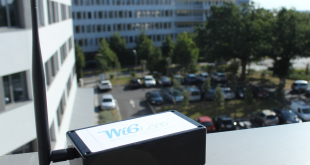Thibaut Lalire, IMT Mines Alès – Institut Mines-Télécom “Material of the 21st century,” a “revolutionary material”: these are some of the ways graphene has been described since it was discovered in 2004 by Konstantin Novoselov and Andre Geim. The two scientists’ research on graphene won them the Nobel Prize in Physics in 2010. But how do things stand today – seventeen …
Read More »Search Results for: Energy transition
Data governance: trust it (or not?)
The original version of this article (in French) was published in the quarterly newsletter no. 20 (March 2021) of the Values and Policies of Personal Information (VP-IP) Chair. On 25 November 2020, the European Commission published its proposal for the European data governance regulation, the Data Governance Act (DGA) which aims to “unlock the economic and societal potential of data and technologies like artificial intelligence “. The …
Read More »Corenstock Chair: a Trial Cylinder for the Heating Industry
As 2021 begins, IMT and elm.leblanc launched the Corenstock Industrial Chair to address issues in energy and digital transition in the domestic heating industry. What is the objective? Within four years, to present a demonstrator for the hot water tank of the future: more resistant, efficient and durable. Behind this prototype lies the development of new economic models for the …
Read More »Power-to-gas, when hydrogen electrifies research
Hydrogen is presented as an energy vector of the future. In a power-to-gas system, it serves as an intermediary for the transformation of electricity into synthetic methane. The success of this energy solution depends heavily on its production cost, so IMT researchers are working on optimizing the different processes for a more competitive power-to-gas solution. Increasing production of renewable energy and reducing …
Read More »Covid-19 Epidemic: an early warning signal that we’ve reached the planet’s limits?
Natacha Gondran, Mines Saint-Étienne – Institut Mines-Télécom and Aurélien Boutaud, Mines Saint-Étienne – Institut Mines-Télécom This article was published for the Fête de la Science (Science Festival, held from 2 to 12 October 2020 in mainland France and from 6 to 16 November in Corsica, overseas departments and internationally), in which The Conversation France is a partner. The theme for this year’s …
Read More »5G: what it is? How does it work?
Xavier Lagrange, Professor of network systems, IMT Atlantique – Institut Mines-Télécom 5G is the fifth generation of standards for mobile networks. Although this technology has fueled many societal debates on its environmental impact, possible health effects, and usefulness, here we will focus on the technological aspects. How does 5G work? Is it a true technological disruption or simple an improvement …
Read More »20 terms for understanding the environmental impact of digital technology
While digital technology plays an essential role in our daily lives, it also a big consumer of resources. To explore the compatibility between the digital and environmental transitions, Institut Mines-Télécom and Fondation Mines-Télécom are publishing their 12th annual brochure entitled Numérique : Enjeux industriels et impératifs écologiques (Digital Technology: Industrial Challenges and Environmental Imperatives). This glossary of 20 terms taken …
Read More »A dictionary for connected devices
The field of connected devices is growing at a staggering pace across all industries. There is a growing need to develop a communication standard, meaning a ‘common language’ that different smart systems could understand and interpret. To contribute to this goal, ETSI (European Telecommunications Standards Institute) is funding a European project in which Mines Saint-Étienne researchers Maxime Lefrançois and Antoine …
Read More »Military vehicles are getting a new look for improved camouflage
I’MTech is dedicating a series of articles to success stories from research partnerships supported by the Télécom & Société Numérique Carnot Institute (TSN), to which IMT Atlantique belongs. How can military vehicles be made more discreet on the ground? This is the question addressed by the Caméléon project of the Directorate General of Armaments (DGA), involving Nexter group and IMT Atlantique …
Read More »Wi6labs: customized sensor networks
Wi6labs, a start-up incubated at IMT Atlantique, installs connected sensor networks for municipalities and industries. What makes this startup so unique? It offers custom-developed private networks that are easy to install. When it comes to controlling energy networks, water supply and monitoring air quality, the solution proposed by Wi6labs is attractive due to its simplicity and the savings it offers. …
Read More » I'MTech L'actualité scientifique et technologique de l'IMT
I'MTech L'actualité scientifique et technologique de l'IMT









